Darrell Castle discusses Trump vs Comey, the Trump – Russia investigation, and what it all means for America.
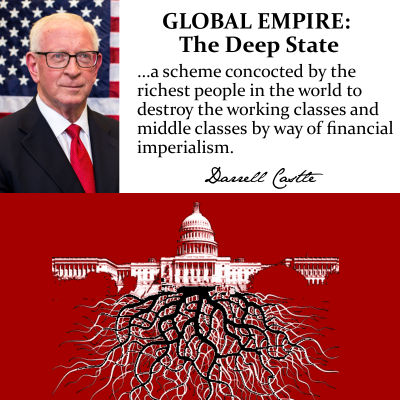

Darrell Castle discusses Trump vs Comey, the Trump – Russia investigation, and what it all means for America.

Darrell Castle talks about why the 2017 presidential election in France was so important to Americans.
Listen to the podcast at http://www.castlereport.us/
In under 8 minutes Dr. Scott Bradley, PhD in Constitutional Law and 2016 Constitution Party VP Nominee, touches on the Constitutionality of the recent missile strike launched against Syria.
For those saying the President has the power to launch an attack:
Article 1, Section 8, Clause 11 of the Constitution of the United States:
[The Congress shall have Power To…] Declare war…
Article 2, Section 2, Clause 1 & 2 of the Constitution of the United States:
The President shall be Commander in Chief of the Army and Navy of the United States, and of the Militia of the several States, when called into the actual Service of the United States…
He shall have Power, by and with the Advice and Consent of the Senate, to make Treaties, provided two thirds of the Senators present concur…
For those citing that Commander-In-Chief = ability to unilaterally launch attacks in which Americans are not in imminent danger:
Thomas Jefferson, in 1801 as President:
He was “unauthorized by the Constitution, without the sanction of Congress, to go beyond the line of defense.”
Federalist 69, Alexander Hamilton:
The President is to be the “commander-in-chief of the army and navy of the United States, and of the militia of the several States, when called into the actual service of the United States. He is to have power to grant reprieves and pardons for offenses against the United States, except in cases of impeachment; to recommend to the consideration of Congress such measures as he shall judge necessary and expedient; to convene, on extraordinary occasions, both houses of the legislature, or either of them, and, in case of disagreement between them with respect to the time of adjournment, to adjourn them to such time as he shall think proper; to take care that the laws be faithfully executed; and to commission all officers of the United States.” In most of these particulars, the power of the President will resemble equally that of the king of Great Britain and of the governor of New York. The most material points of difference are these: — First. The President will have only the occasional command of such part of the militia of the nation as by legislative provision may be called into the actual service of the Union. The king of Great Britain and the governor of New York have at all times the entire command of all the militia within their several jurisdictions. In this article, therefore, the power of the President would be inferior to that of either the monarch or the governor. Second. The President is to be commander-in-chief of the army and navy of the United States. In this respect his authority would be nominally the same with that of the king of Great Britain, but in substance much inferior to it. It would amount to nothing more than the supreme command and direction of the military and naval forces, as first General and admiral of the Confederacy; while that of the British king extends to the declaring of war and to the raising and regulating of fleets and armies — all which, by the Constitution under consideration, would appertain to the legislature.1 The governor of New York, on the other hand, is by the constitution of the State vested only with the command of its militia and navy. But the constitutions of several of the States expressly declare their governors to be commanders-in-chief, as well of the army as navy; and it may well be a question, whether those of New Hampshire and Massachusetts, in particular, do not, in this instance, confer larger powers upon their respective governors, than could be claimed by a President of the United States.
For those insinuating that an Act, Treaty, Resolution, or international law warrants usurpation of the Constitution and carries the same weight as a Constitutional Amendment which changes the Constitution:
St. George Tucker, View of the Constitution of the United States:
“Let it be supposed, for example, that the president and senate should stipulate by treaty with any foreign nation, that in case of war between that nation and any other, the United States should immediately declare against that nation: Can it be supposed that such a treaty would be so far the law of the land, as to take from the house of representatives their constitutional right to deliberate on the expediency or inexpediency of such a declaration of war, and to determine and act thereon, according to their own judgement?”
Also… James Madison, Constitutional Debates
“Does it follow, because this power [treaty power] is given to Congress. That it is absolute and unlimited? I do not conceive that power is given to the President and Senate to dismember the empire, or to alienate any great, essential right. I do not think the whole legislative authority have this power. The exercise of the power must be consistent with the object of the delegation.”
And Thomas Jefferson, Manual of Parliamentary Practice:
“By the general power to make treaties, the Constitution must have intended to comprehend only those objects which are regulated by treaty and cannot be otherwise regulated. . . . It must have meant to except out of these rights reserved to the states, for surely the President and Senate cannot do by treaty what the whole government is interdicted from doing in any way.”
Obvious logical flaws with support for the strikes…
Who did it, with proof, please? – People are so convinced that Assad conducted the chemical weapon attacks. Why would he? Assad has changed the tide of the war over the past couple of years and has finally even been winning the P.R. War. None of this matters because it isn’t Constitutional, but there’s no logic behind an Assad attack.
But the innocent children! – 1. Don’t we hate when liberals demagogue and use the heart-wrenching, doomsday, or Alinskyite tactics? Why would conservatives resort to them? 2. We killed 4 innocent children in those strikes. If this provokes a war, how many of our children will die in a war that we have no business being in? 3. Millions of innocent AMERICAN children are murdered at the hands of Planned Parenthood. Where is the outcry regarding the genocide at home? Isn’t Trump’s daughter lobbying for PP now? Would there be rage if it were Planned Parenthood being attacked due to what they do to innocent children and women daily, or is that ok?
Was the United States in imminent danger? – Were we on the brink, with verifiable intelligence, of being attacked by Syria? Even if someone states that we were, intelligence informed us about WMD’s in Iraq, none there. They told us that Benghazi was caused by a video. Instead, our Intelligence agencies were running guns from Benghazi to Syrian rebels, aka TO ISIS!
Are we now siding with ISIS, against Christians? – It is common knowledge that Assad is fighting ISIS and has been protecting the persecuted Coptic Christians for quite some time. Are we not assisting ISIS by firing missiles on the Syrian military? Are we fighting against Christianity in the Middle East?
Ohhhhh the Hypocrisy! – Donald J. Trump in 2013 after a previous, supposed chemical weapon attack by Assad on his people via Twitter: “The President must get Congressional approval before attacking Syria-big mistake if he does not!”
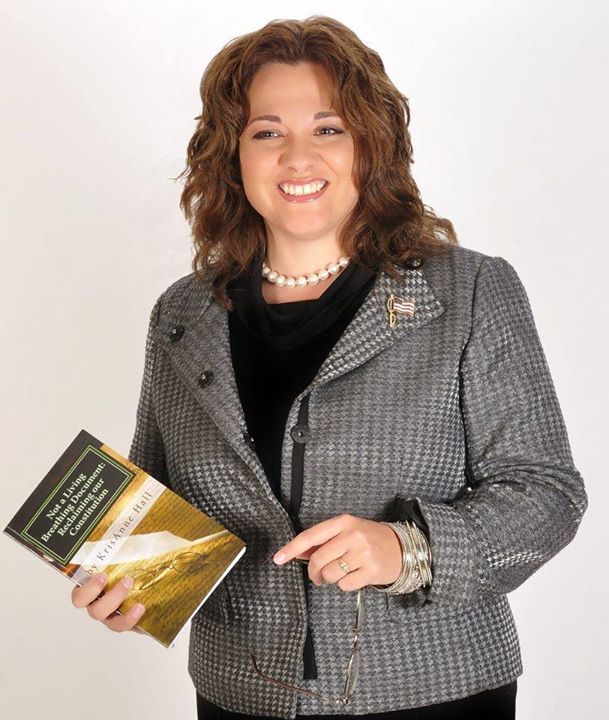
KrisAnne Hall is a native of St. Louis, Missouri. She got her bachelor’s degree in biology and chemistry from Black college in Illinois, joined the United States Army, was trained as a Russian linguist for military intelligence in the Army. She has also worked for the Missouri state attorney’s office for many years as a prosecutor after graduating from the University of Florida, Levin College of Law, working under Jerry Player. She later went to work at a constitutional law firm defending religious and first amendment liberty for several years. Returning to the state attorney’s office in Missouri’s, she worked under the Honorable Skip Jarvis. From there she was providentially launched into speaking about American liberties and the Constitution. KrisAnne now travels across the nation teaching an average of 265 events in over 22 states for about the last six years. In addition, she has a radio show which broadcasts six days a week, including one as a television show on the Christian television network- Lifestyle Channel. Her slogan is Liberty Over Security, Principle Over Party, and Truth Over Your Favorite Personality. She believes that we should protect, defend and abide by constitutional principles no matter who’s in office or which party is in power.
C-Span is now featuring her on C-Span 2’s Book TV program. KrisAnne speaks about her book Sovereign Duty, in which she outlines what citizens can do to ensure that their constitutional rights are protected. She argued that the federal government has failed in its duty to uphold the Constitution. Catch one of the upcoming airings, or view it below.
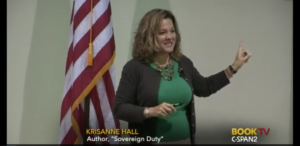
Your national chairman,
![]()
Frank Fluckiger

Watch this video of Wild Bill for America, over 42.000 YouTube Subscribers, discuss why Americans should join the Constitution Party!

“Liberty’s Lobbyist”, Krisanne Hall, discusses the constitutionality of President Trump’s latest Executive Order – the so-called “Muslim Ban”.
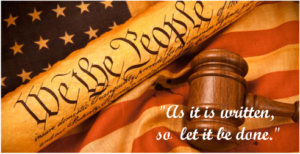
Darrell Castle discusses the original intent of the US Constitution.
“[Original Intent] No judges employ it, and no lawyers argue it. It is not desired by any politicians or by their special interest groups for whom the Constitution’s quaint words and phrases serve only as a cover story for what best lines their pockets.”
Full Article on The Castle Report
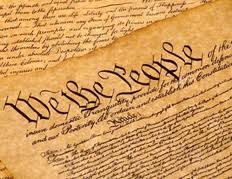
Test your Constitutional knowledge!
[quiz]
[question]1. The Congress of the United States consists of…
[/question]
[wrong]the House of Representatives
[explanation]The Congress shall consist of the House and Senate (Art 1 §1)[/explanation]
[/wrong]
[wrong]the Senate
[explanation]The Congress shall consist of the House and Senate (Art 1 §1)[/explanation]
[/wrong]
[answer]the House and Senate
[/answer]
[/quiz]
[quiz]
[question]2. All bills for raising revenue shall originate in..
[/question]
[wrong]the Senate
[explanation]All bills for raising revenue shall originate in the House of Representatives (Art 1 §7)[/explanation]
[/wrong]
[wrong]legislative committees
[explanation]All bills for raising revenue shall originate in the House of Representatives (Art 1 §7)[/explanation]
[/wrong]
[answer]the House
[/answer]
[wrong]the IRS
[explanation]All bills for raising revenue shall originate in the House of Representatives (Art 1 §7)[/explanation]
[/wrong]
[/quiz]
[quiz]
[question]3. Which of the following powers is NOT granted to Congress?
[/question]
[wrong]to coin money
[explanation]The Constitution does not grant Congress the power to regulate schools. The Tenth Amendment says that all powers not listed are vested in the States and the People. How Congress came up with this power is beyond the scope of the plain wording and the intent of the Constitution.[/explanation]
[/wrong]
[wrong]to declare war
[explanation]The Constitution does not grant Congress the power to regulate schools. The Tenth Amendment says that all powers not listed are vested in the States and the People. How Congress came up with this power is beyond the scope of the plain wording and the intent of the Constitution.[/explanation]
[/wrong]
[wrong]to fix the standards of weights and measures
[explanation]The Constitution does not grant Congress the power to regulate schools. The Tenth Amendment says that all powers not listed are vested in the States and the People. How Congress came up with this power is beyond the scope of the plain wording and the intent of the Constitution.[/explanation]
[/wrong]
[answer]to regulate schools
[/answer]
[wrong]all of the above
[explanation]The Constitution does not grant Congress the power to regulate schools. The Tenth Amendment says that all powers not listed are vested in the States and the People. How Congress came up with this power is beyond the scope of the plain wording and the intent of the Constitution.[/explanation]
[/wrong]
[/quiz]
[quiz]
[question]4. The Bill of Rights consists of how many amendments to the Constitution?
[/question]
[wrong]three
[explanation]The Bill of Rights is the first ten amendments to the Constitution.[/explanation]
[/wrong]
[wrong]twenty
[explanation]The Bill of Rights is the first ten amendments to the Constitution.[/explanation]
[/wrong]
[wrong]five
[explanation]The Bill of Rights is the first ten amendments to the Constitution.[/explanation]
[/wrong]
[answer]ten
[/answer]
[/quiz]
[quiz]
[question]5. In regards to our rights, the Constitution:
[/question]
[wrong]gives them to us
[explanation]Although Congress does try to play God over our behavior, the intent of the Constitution is to define, affirm, and protect our rights (see Preamble).[/explanation]
[/wrong]
[answer]defines, affirms, and protects them
[/answer]
[wrong]changes them with each election
[explanation]Although Congress does try to play God over our behavior, the intent of the Constitution is to define, affirm, and protect our rights (see Preamble).[/explanation]
[/wrong]
[wrong]plays God over our behavior
[explanation]Although Congress does try to play God over our behavior, the intent of the Constitution is to define, affirm, and protect our rights (see Preamble).[/explanation]
[/wrong]
[/quiz]
[quiz]
[question]6. Where is the phrase “separation of church and state” found?
[/question]
[wrong]the Declaration of Independence
[explanation]It is surprising how many Christians and conservatives get this one wrong. It must be from too many years of brainwashing by the ACLU. “Separation of church and state” is a phrase used in a letter from Thomas Jefferson to the Danbury Baptist Association on January 1st, 1802. The Baptists were afraid Congress would establish a state denomination. Jefferson wrote to assure them the Constitution forbid the establishment of any denomination as the state church. On the other hand, we know Jefferson never intended to impede public religious activity, or expression because he not only signed bills appropriating financial support for chaplains in Congress and the armed services; he signed the articles of war in 1806 which urged soldiers to attend church services; he offered a National Prayer For Peace in 1805; and he wrote in a letter to Samuel Miller, in 1808, he viewed “the government of the US as interdicted by the Constitution from intermeddling with religious institutions, their doctrines, discipline, or exercises.” (America’s God and Country, Federer, William J. 1994, FAME Publishing, pgs 324-28).[/explanation]
[/wrong]
[wrong]the Articles of Confederation
[explanation]It is surprising how many Christians and conservatives get this one wrong. It must be from too many years of brainwashing by the ACLU. “Separation of church and state” is a phrase used in a letter from Thomas Jefferson to the Danbury Baptist Association on January 1st, 1802. The Baptists were afraid Congress would establish a state denomination. Jefferson wrote to assure them the Constitution forbid the establishment of any denomination as the state church. On the other hand, we know Jefferson never intended to impede public religious activity, or expression because he not only signed bills appropriating financial support for chaplains in Congress and the armed services; he signed the articles of war in 1806 which urged soldiers to attend church services; he offered a National Prayer For Peace in 1805; and he wrote in a letter to Samuel Miller, in 1808, he viewed “the government of the US as interdicted by the Constitution from intermeddling with religious institutions, their doctrines, discipline, or exercises.” (America’s God and Country, Federer, William J. 1994, FAME Publishing, pgs 324-28).[/explanation]
[/wrong]
[answer]a personal letter
[/answer]
[wrong]the Constitution
[explanation]It is surprising how many Christians and conservatives get this one wrong. It must be from too many years of brainwashing by the ACLU. “Separation of church and state” is a phrase used in a letter from Thomas Jefferson to the Danbury Baptist Association on January 1st, 1802. The Baptists were afraid Congress would establish a state denomination. Jefferson wrote to assure them the Constitution forbid the establishment of any denomination as the state church. On the other hand, we know Jefferson never intended to impede public religious activity, or expression because he not only signed bills appropriating financial support for chaplains in Congress and the armed services; he signed the articles of war in 1806 which urged soldiers to attend church services; he offered a National Prayer For Peace in 1805; and he wrote in a letter to Samuel Miller, in 1808, he viewed “the government of the US as interdicted by the Constitution from intermeddling with religious institutions, their doctrines, discipline, or exercises.” (America’s God and Country, Federer, William J. 1994, FAME Publishing, pgs 324-28).[/explanation]
[/wrong]
[/quiz]
[quiz]
[question]7. According to the Constitution, and except for Washington D.C., how much land can the federal government own, or control?
[/question]
[wrong]wilderness and forestland
[explanation]The Constitution allows the federal government to own or control only that section of land know as Washington D.C. and land “for the Erection of Forts, Magazines, Arsenals, dock-yards, and other needful Buildings.” (Art 1 §8 (17))[/explanation]
[/wrong]
[wrong]national parks and monuments
[explanation]The Constitution allows the federal government to own or control only that section of land know as Washington D.C. and land “for the Erection of Forts, Magazines, Arsenals, dock-yards, and other needful Buildings.” (Art 1 §8 (17))[/explanation]
[/wrong]
[answer]forts, magazines, arsenals, dock yards, and other needful buildings
[/answer]
[wrong]range and wildlife habitat
[explanation]The Constitution allows the federal government to own or control only that section of land know as Washington D.C. and land “for the Erection of Forts, Magazines, Arsenals, dock-yards, and other needful Buildings.” (Art 1 §8 (17))[/explanation]
[/wrong]
[wrong]All of the above
[explanation]The Constitution allows the federal government to own or control only that section of land know as Washington D.C. and land “for the Erection of Forts, Magazines, Arsenals, dock-yards, and other needful Buildings.” (Art 1 §8 (17))[/explanation]
[/wrong]
[/quiz]
[quiz]
[question]8. Which amendment and date authorized the Federal Reserve System?
[/question]
[wrong]Amendment 16 in 1913
[explanation]There is no such amendment authorizing the Federal Reserve System.[/explanation]
[/wrong]
[wrong]Amendment 20 in 1953
[explanation]There is no such amendment authorizing the Federal Reserve System.[/explanation]
[/wrong]
[wrong]Amendment 16 in 1923
[explanation]There is no such amendment authorizing the Federal Reserve System.[/explanation]
[/wrong]
[answer]there is no such amendment
[/answer]
[/quiz]
[quiz]
[question]9. How many states were represented at the Constitutional Convention?
[/question]
[wrong]13
[explanation]There were 13 original States; however, Rhode Island did not have any representatives at the Constitutional Convention. They were jealous of their rights and believed the larger States would overpower or swallow up the smaller States in the creation of a new union. They were the last State to ratify the Constitution; the last to get on board, only after they realized the nation was going ahead without them.[/explanation]
[/wrong]
[answer]12
[/answer]
[wrong]None, they were colonies.
[explanation]There were 13 original States; however, Rhode Island did not have any representatives at the Constitutional Convention. They were jealous of their rights and believed the larger States would overpower or swallow up the smaller States in the creation of a new union. They were the last State to ratify the Constitution; the last to get on board, only after they realized the nation was going ahead without them.[/explanation]
[/wrong]
[wrong]50
[explanation]There were 13 original States; however, Rhode Island did not have any representatives at the Constitutional Convention. They were jealous of their rights and believed the larger States would overpower or swallow up the smaller States in the creation of a new union. They were the last State to ratify the Constitution; the last to get on board, only after they realized the nation was going ahead without them.[/explanation]
[/wrong]
[wrong]10
[explanation]There were 13 original States; however, Rhode Island did not have any representatives at the Constitutional Convention. They were jealous of their rights and believed the larger States would overpower or swallow up the smaller States in the creation of a new union. They were the last State to ratify the Constitution; the last to get on board, only after they realized the nation was going ahead without them.[/explanation]
[/wrong]
[/quiz]
[quiz]
[question]10. Which Article and Section of the Constitution enumerates the specific powers of Congress? How many are listed?
[/question]
[answer]Article 1, §8; 18 powers
[/answer]
[wrong]Article 12, §2; anything except those protected in the Bill of Rights
[explanation]The powers are enumerated in Article 1, §8. There are 18 of them.[/explanation]
[/wrong]
[wrong]Article 4. §4; 58 powers
[explanation]The powers are enumerated in Article 1, §8. There are 18 of them.[/explanation]
[/wrong]
[wrong]Article 3, §1; anything except those protected in the Bill of Rights
[explanation]The powers are enumerated in Article 1, §8. There are 18 of them.[/explanation]
[/wrong]
[wrong]None of the Above
[explanation]The powers are enumerated in Article 1, §8. There are 18 of them.[/explanation]
[/wrong]
[/quiz]
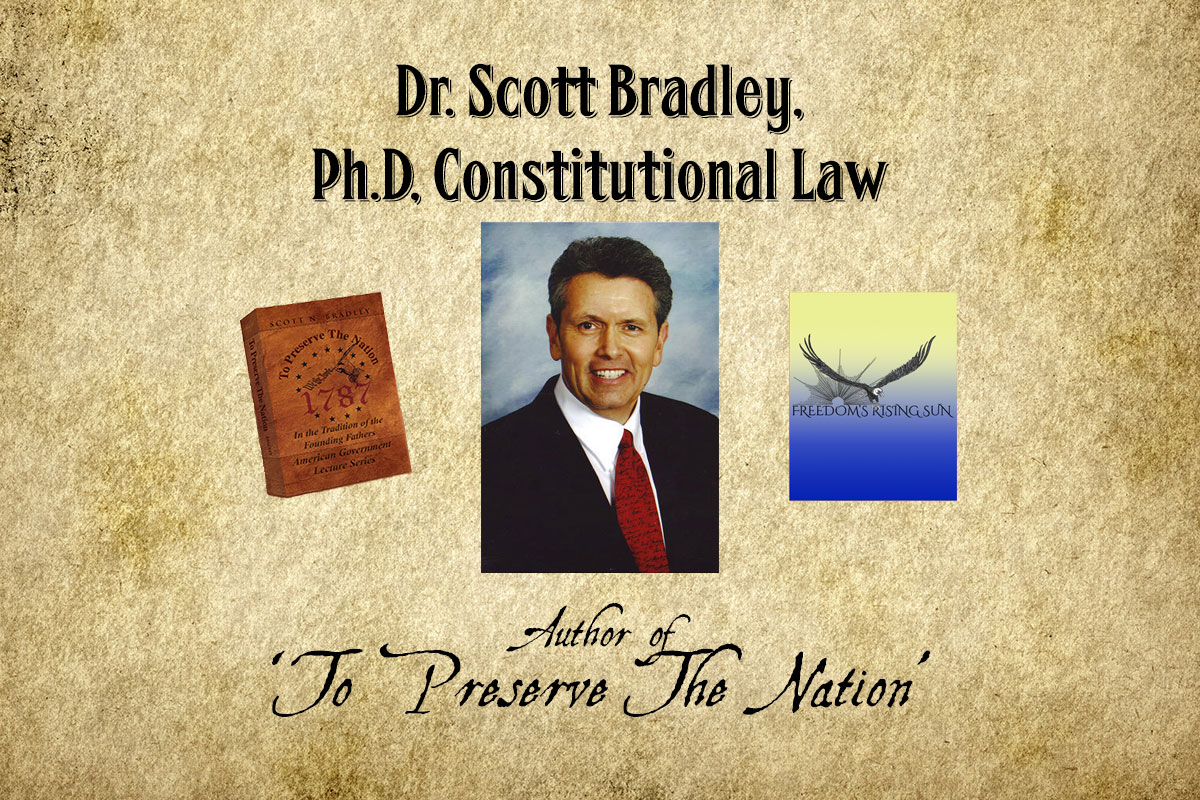
Join 2016 Constitution Party Vice-Presidential Nominee and author of “To Preserve the Nation“, Dr. Scott Bradley, for FREE Educational Webinars, Constitutional Articles, Videos, and more at www.freedomsrisingsun.com!
[vimeo 192224279 w=1100]
Electoral College from Scott N. Bradley on Vimeo.